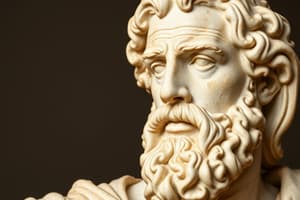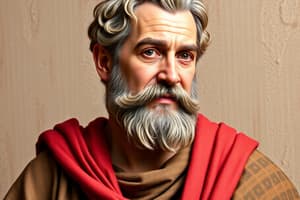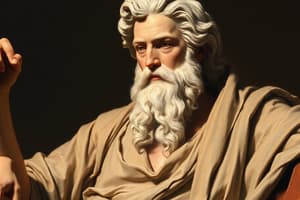Podcast
Questions and Answers
Plato's father was named Pyrilampes.
Plato's father was named Pyrilampes.
False (B)
Plato spent 12 years traveling to southern Italy and studying with Pythagoreans.
Plato spent 12 years traveling to southern Italy and studying with Pythagoreans.
True (A)
Plato founded the Academy after returning to Athens at the age of 50.
Plato founded the Academy after returning to Athens at the age of 50.
False (B)
Plato's dialogues feature Socrates as the main character in all but one of his works.
Plato's dialogues feature Socrates as the main character in all but one of his works.
Plato received education solely in mathematics and gymnastics.
Plato received education solely in mathematics and gymnastics.
What was the primary influence on Plato's early philosophical development?
What was the primary influence on Plato's early philosophical development?
How long did Plato spend traveling and studying with other philosophers after Socrates' death?
How long did Plato spend traveling and studying with other philosophers after Socrates' death?
What type of educational institution did Plato establish in Athens?
What type of educational institution did Plato establish in Athens?
Which of the following characters prominently appears in the majority of Plato's surviving writings?
Which of the following characters prominently appears in the majority of Plato's surviving writings?
What geographic area did Plato mainly explore during his years of travel for philosophical study?
What geographic area did Plato mainly explore during his years of travel for philosophical study?
Flashcards are hidden until you start studying
Study Notes
Early Life & Education
- Born circa 428 B.C. during the Golden Age of Athens.
- From noble Athenian lineage; father Ariston passed away in childhood.
- Grew up amidst the Peloponnesian War (431-404 B.C.) and its aftermath.
- Received education in philosophy, poetry, and gymnastics from esteemed teachers, including Cratylus.
Influences
- Became a follower of Socrates; involved in events leading to Socrates’ condemnation.
- Socratic method influenced Plato's early dialogues and writings.
- Authored "Apologia," depicting Socrates' trial; serves as a primary source on Socratic thought.
- Spent 12 years traveling through Italy, Sicily, and Egypt post-Socrates' death.
- Studied under Pythagorean followers like Theodorus of Cyrene, expanding his interest in mathematics.
Platonics Academy
Plato's Dialogues
- Composed 36 dialogues featuring Socrates in all but one, categorized as early, middle, and late based on style.
- "Symposium" discusses love, proposing that romantic desire should be transformed into truth-seeking.
- "Meno" illustrates wisdom as recollection, using a geometric proof with an untaught boy as an example.
- "Republic" explores the parallels between the soul of a nation and the individual, advocating for a hierarchical society led by reason.
- Late dialogues resemble explorations of specific topics, with "Timaeus" addressing cosmology and “Laws” reflecting on practical governance.
Quotes
- Famous for several notable quotes:
- "Love is a serious mental disease."
- "When the mind is thinking it is talking to itself."
- "Wise men talk because they have something to say; fools, because they have to say something."
- "Music is a moral law."
- "One of the penalties for refusing to participate in politics is that you end up being governed by your inferiors."
- "Man—a being in search of meaning."
Fast Facts
- Competed in the Isthmian Games as a wrestler during youth.
- Born Aristocles; "Plato" may reference his broad shoulders.
- Died in 347 B.C.E.; burial site remains undiscovered.
Contributions
- Academy: Established an academic program emphasizing science and mathematics.
- Meno: Explores teachability of virtue and understanding knowledge acquisition.
- Republic: Detailed examination of justice and the ideal state.
- Lysis: Investigates the essence of friendship and love.
Applications
- Government: Critiques democracy for excessive freedom and the rise of self-serving leaders.
- Equality: Advocated for gender equality, stating women should have equal opportunities despite physical differences.
Early Life & Education
- Born circa 428 B.C. during the Golden Age of Athens.
- From noble Athenian lineage; father Ariston passed away in childhood.
- Mother Perictione remarried politician Pyrilampes.
- Grew up amidst the Peloponnesian War (431-404 B.C.) and its aftermath.
- Received education in philosophy, poetry, and gymnastics from esteemed teachers, including Cratylus.
Influences
- Became a follower of Socrates; involved in events leading to Socrates’ condemnation.
- Socratic method influenced Plato's early dialogues and writings.
- Authored "Apologia," depicting Socrates' trial; serves as a primary source on Socratic thought.
- Spent 12 years traveling through Italy, Sicily, and Egypt post-Socrates' death.
- Studied under Pythagorean followers like Theodorus of Cyrene, expanding his interest in mathematics.
Platonics Academy
- Founded the Academy around 387 B.C. in a grove near Athens, recognized as the first Western university.
- Delivered lectures, attracting students largely from the Greek world.
- Aristotle joined the Academy at age 17, where he studied under Plato for 20 years.
- Plato's writings from this period are primarily based on his teachings.
Plato's Dialogues
- Composed 36 dialogues featuring Socrates in all but one, categorized as early, middle, and late based on style.
- "Symposium" discusses love, proposing that romantic desire should be transformed into truth-seeking.
- "Meno" illustrates wisdom as recollection, using a geometric proof with an untaught boy as an example.
- "Republic" explores the parallels between the soul of a nation and the individual, advocating for a hierarchical society led by reason.
- Late dialogues resemble explorations of specific topics, with "Timaeus" addressing cosmology and “Laws” reflecting on practical governance.
Quotes
- Famous for several notable quotes:
- "Love is a serious mental disease."
- "When the mind is thinking it is talking to itself."
- "Wise men talk because they have something to say; fools, because they have to say something."
- "Music is a moral law."
- "One of the penalties for refusing to participate in politics is that you end up being governed by your inferiors."
- "Man—a being in search of meaning."
Fast Facts
- Competed in the Isthmian Games as a wrestler during youth.
- Born Aristocles; "Plato" may reference his broad shoulders.
- Died in 347 B.C.E.; burial site remains undiscovered.
Contributions
- Academy: Established an academic program emphasizing science and mathematics.
- Meno: Explores teachability of virtue and understanding knowledge acquisition.
- Republic: Detailed examination of justice and the ideal state.
- Lysis: Investigates the essence of friendship and love.
Applications
- Government: Critiques democracy for excessive freedom and the rise of self-serving leaders.
- Equality: Advocated for gender equality, stating women should have equal opportunities despite physical differences.
Studying That Suits You
Use AI to generate personalized quizzes and flashcards to suit your learning preferences.




